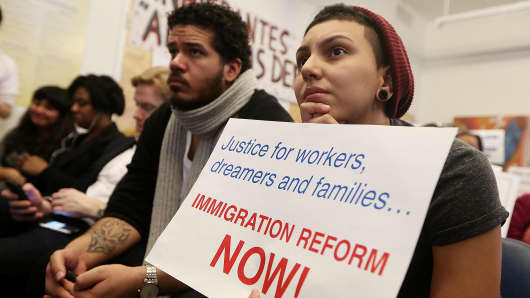Legalize or not is the hotly debated question in Washington holding the fate of 11 million undocumented immigrants on a tight rope.
Whether it's the right thing to do or not, many are trying to determine the impact legalization would have on the economy.
Those against it, like the Federation for American Immigration Reform (FAIR), argue that legalization would entice more foreigners to cross the border illegally and thus become a burden to the already ailing U.S. economy by increasing competition with U.S.-born workers and draining government-funded programs.
"Amnesty rewards illegal behavior, encourages more and is fundamentally unfair to those who have come here legally," said Kristen Williamson, a spokeswoman for FAIR. "This is a largely low-skill, low-wage population that would now be required to file taxes, but would not necessarily be people who are paying net contributions to taxes, so they would be eligible for benefits."
On the other side of the pole are others, however, who support and strongly advocate the need to legalize immigrants, alleging that it's the key to vitalize the U.S. economy.
UCLA professor Raul Hinojosa-Ojeda, the author of The Economic Benefits of Comprehensive Immigration Reform, is one of them.
Hinojosa-Ojeda says that 11 million immigrants would be the equivalent to more than $1.5 trillion, or roughly 1 percent, added to the gross domestic product (GDP) in a period of 10 years The U.S.GDP, defined as the output of goods and services produced by labor and property, is approximately $15 trillion, according to the World Bank.
"That means a lot of good things for the economy. It means there is more money circulating in the economy. It means the economy is able to support a lot more jobs, so everybody wins," Hinojosa-Ojeda said. "One of the reasons we grow and we have GDP growth is because we have new workers. The economy can't grow if we don't add these workers."
In his research, Hinojosa-Ojeda studied three scenarios: the economic impact of a comprehensive immigration reform that would create a path to legalization, a temporary work program with no option to permanent legal status, and the deportation of undocumented immigrants.
He concluded that legalizing immigrants would be more beneficial to the economy by generating additional taxes, increasing consumption and allowing immigrants to climb the occupational ladder, among other things.
Expelling immigrants, on the other hand, would be more expensive, costing $2.6 trillion to the GDP over a period of 10 years, excluding the cost of deportation, the report states.
U.S. Immigration and Customs Enforcement says it costs the government an estimated $8,318 to deport each person.
Hinojosa-Ojeda's study took the 1986 Immigration Reform and Control Act (IRCA), an amnesty program that legalized approximately about 3 million immigrants during the Reagan administration, as an example and model to estimate the effects legalized immigrants would have on economy.
"In those three years after the amnesty wages went up on average by 15-20 percent for the undocumented, after having been flat or actually declining for the last 10 years before that," Hinojosa-Ojeda said.
In a report by the Department of Labor in the mid-'90s shows that even though immigrants still earned less than U.S. natives, their wages went up 15 percent few years after being legalized in 1986.
This wage increase, Hinojosa explains, would not only help boost the economy, but it would also decrease unauthorized immigration.
"Ronald Reagan saw the biggest decline ever of undocumented workers crossing the border after IRCA without spending a gazillion dollars on border control," Hinojosa-Ojeda said. "When you raise the wage floor, minimum wage, you can't get around exploiting workers. The demand for easily exploitable workers goes away."
FAIR challenges these facts, saying the 11 million unauthorized immigrants demonstrate the opposite of what Hinojosa argues.
"Directly after IRCA, the illegal alien population decreased because 3 million illegal aliens were given amnesty. That is by no means proof that amnesty stops illegal immigration," Williamson said. "Now over 25 years after our last mass amnesty and broken promises for enforcement, the illegal alien population stands at nearly 12 million."
A 2011 report by FAIR states that undocumented immigrants "impose a fiscal burden," costing the government $113 billion per year in welfare programs. The report also states that immigrants use more welfare programs than those who were born in the United States.
Public Policy Institute of California Research Fellow Laura Hill, co-author of "Immigrant Legalization: Assessing the Labor Market Effects, doesn't agree with FAIR. PPIC is a nonprofit, nonpartisan think tank based in California.
"Evidence suggests that they don't become a burden at a higher rate than anyone else," Hill said. "By large, immigrants are much more likely to be working than natives. They're more involved in the labor force."
Hill's study, however, shows something different from FAIR's and Hinojosa's research.
The legalization of undocumented immigrants would have a neutral impact on the economy: "I don't think there is a big change to the economy taking them from unauthorized to authorized status because we already have a lot of those positive benefits from those same immigrants."
Hill's study found that many undocumented immigrants already file federal taxes and pay sales and payroll taxes.
"Legalization is not a bad idea, I am saying that we shouldn't expect the economy to blossom because of a legalization program," Hill explained.
Hill also said legalizing immigrants would not increase competition on U.S. citizens in the workforce because: "low-skill workers are not in a position to quickly go out and demand higher wages or apply for better jobs," she explained.
There would be positive impact on high skill workers who would be able to attain better jobs and wages, Hill said.
While the debate goes on, the real economic effects of legalization will roll out as the details on immigration reform are sorted out in Washington.


